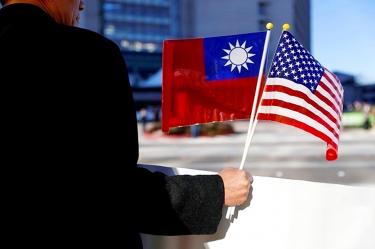The US House of Representatives on Tuesday passed the Taiwan Assurance Act of 2019 and House Resolution 273 reaffirming the US’ commitment to Taiwan and the implementation of the Taiwan Relations Act (TRA).
The Taiwan Assurance Act was passed without objection, while the resolution was carried in a vote of 414 votes in favor, zero against and 17 abstentions.
“It is the sense of [the US] Congress that Taiwan is a vital part of the United States free and open Indo-Pacific strategy,” the Taiwan Assurance Act reads.
The US should “conduct regular sales and transfers of defense articles to Taiwan in order to enhance its self-defense capabilities, particularly its efforts to develop and integrate asymmetric capabilities, including undersea warfare and defense capabilities, into its military forces,” it says.
In the fourth section on “Taiwan’s Inclusion in International Organizations,” the Taiwan Assurance Act says that it is US policy to advocate for the nation’s “meaningful participation” in international bodies “as appropriate,” giving as examples the UN, the World Health Assembly, the International Civil Aviation Organization and the International Criminal Police Organization, commonly known as Interpol.
It is also US policy to advocate for Taiwan’s membership in the Food and Agriculture Organization, UNESCO and “other international organizations for which statehood is not a requirement for membership,” it says.
It requires the US secretary of state to review the US Department of State’s guidance governing relations with Taiwan, including its “Guidelines on Relations with Taiwan” and other documents, and to reissue the guidance to the US government’s executive branch departments and agencies within 180 days of enactment.
Meanwhile, the resolution says that the TRA and the “six assurances” have been “essential components in helping to maintain peace, security and stability in the Western Pacific,” and are “cornerstones” of US policy toward Taiwan.
The House encourages mutual visits between US and Taiwanese officials, per the Taiwan Travel Act that was signed into law in March last year, the resolution says.
It also reiterates that the US president should conduct “regular transfers of defense articles to Taiwan consistent with Taiwan’s national security requirements in accordance to prior legislation.”
It calls on the secretary of state to “actively engage internationally in support of Taiwan’s meaningful participation in international organizations engaged in addressing transnational threats and challenges,” and recognizes Taiwan’s “partnership in combating global terrorism.”
In Taipei yesterday, Presidential Office spokesman Xavier Chang (張惇涵) thanked the House for its support, saying that the passage of the resolution is especially important on the 40th anniversary of the TRA.
Calling the US Taiwan’s “most important partner in the international community,” Chang said that the government’s efforts over the past three years have allowed it to be seen as a reliable partner in maintaining the “status quo” of regional peace and stability.
Taiwan’s strategic importance is no longer restricted to the Taiwan Strait, but now includes the Pacific, he said.
Taiwan would continue to play a role in maintaining the “status quo” of regional peace and stability with its partners, he added.
Source: Taipei Times - 2019/05/09





















